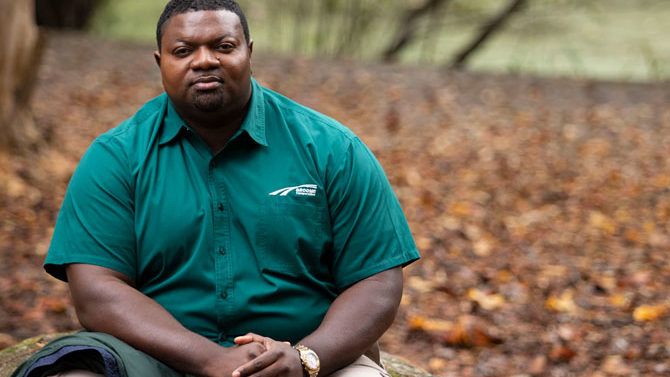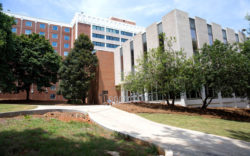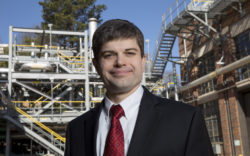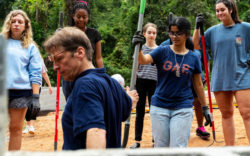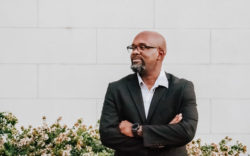Wesley Chenoweth’s day job is driving to and from the Atlanta airport. When he’s not behind the wheel for Groome Transportation, you can find Chenoweth volunteering for nonprofit organizations such as Care Convoy and Sister Cities and helping coordinate global relief efforts—mostly to Liberia, his home country.
Twenty years ago, Chenoweth was a civil engineer and a graduate of Syracuse University living in New York City with a six-figure salary. He decided to give it all up to give back.
“My friends were like, ‘What are you doing?’” he said jokingly about his transition from working as an engineer to turning his focus towards humanitarian work.
Growing up, he knew he wanted to be an engineer so he could “rebuild” Liberia. “Liberia is lacking a lot of things: infrastructure, development, education, health, you name it. The country needs everything,” he said.
However, in 2016, Liberia was in need of everything more than ever. In 2013, an Ebola outbreak spread into the country. By 2016, the disease was rampant, causing major loss of life and socioeconomic disruption in Liberia, Guinea and Sierra Leone. To Chenoweth, the Ebola outbreak was more than just news coverage. It was reality. Several of his family members who were living in Liberia were directly affected, including his cousin, who died from the disease.
Though he was still stateside, Chenowth said he decided he would do everything in his power to help Liberia. From loading hospital beds and medical supplies into a 40-foot container or fundraising for resources to ship to West Africa, Chenoweth said he made it his mission to push Liberia and other West African countries out of poverty and never allow a crisis like Ebola to happen again. Today, Chenoweth is the East Coast director of Care Convoy.
Through the nonprofit Global Peace Partners Inc., Care Convoy sent over $11.7 million worth of medical, fire and rescue equipment and vehicles to countries in need—including those in West Africa, Chenoweth said.
He said he began taking courses with FEMA for emergency management, disaster relief and incident command systems. He also joined groups such as the Community Emergency Response Team, Africa Environmental Watch and the Black Emergency Managers Association (BEMA), which focuses on providing disaster relief to countries in the Caribbean, Africa and South America, Chenoweth said. From there, he began advocating for policy to help Africa, even traveling to Washington DC to speak to the Congressional Black Caucus about policy change and later lobbying on Capitol Hill to end famine in Africa.
Current initiatives of the Maryland-Liberia Sister States committee include providing emergency management training and medical and disaster relief supplies. In addition, the organization pairs Maryland businesses with Liberian businesses to stimulate economic development, and also conducts health fairs.
“You can help a business, an individual, a college, a clinic in a city across the country or across the water and link them up with a corresponding college, clinic or business. It’s just, putting that together is awesome,” Chenoweth said.
Chenoweth previously served as the general secretary of the Maryland-Liberia Sister States committee before moving to Athens. Mary Nitsch, the director of international affairs for the Maryland Secretary of State’s office, oversees Maryland’s Sister States committees and saw firsthand the impact Chenoweth made with the organization. Nitsch said Chenoweth has been “instrumental” in the committee through social media outreach. She said he was “very active” in the organization and attended different Sister States events associated with other international programs, not just those dealing with Liberia.
Originally, Chenoweth said he started out with a “one-track mind” of helping Liberia. Through his experience in Maryland and D.C., he had the opportunity to meet with other organizations and brainstorm to problem-solve. Now, he said he thinks about helping globally.
Most recently, Chenoweth helped organize a shipment of medical supplies and equipment to Mexico. Overall, Sister Cities and Care Convoy sent supplies valued at over $350,000 to the Mexican state of Tamaulipas for health-care facilities that were lacking essentials in the aftermath of a series of earthquakes.
In the end, Chenoweth said engineering and his life experiences have prepared him for his humanitarian work. “Engineering teaches you to solve problems and break [them] down into small ones,” he said.
After a military coup in 1980, Chenoweth and his family moved to the United States to escape a brutal civil war in Liberia. His father and much of his family were involved in the Liberian government prior to the coup and were threatened with execution.
His family ended up in Queens, where his father was recruited by the Methodist Church to “clean [Queens] up and get people closer to God,” Chenoweth said. At the time, crack was king in New York City, which unleashed an unprecedented wave of drug addiction and violence, in addition to the city facing bankruptcy.
Chenoweth said it was then that he learned how to give back, whether it was helping his dad around the church, folding pamphlets for service or volunteering around the community.
“As a child, you grow up watching your parents. Initially, [humanitarian work] wasn’t my interest,” Chenoweth said. “My interest was engineering and, as a young man in New York City, making money.” He said his dream was to drive a black SUV with his nickname, “Big Wes,” on the license plate. “Then, one day, I got that. I was so happy… But those things, at the end of the day, never gave me real happiness.”
Now, Chenoweth wants to give back in Athens. To begin, he’s starting up a local branch of Care Convoy. He said he hopes that, in the future, he’ll be able to work with the University of Georgia and possibly the Institute for African Studies.
Like what you just read? Support Flagpole by making a donation today. Every dollar you give helps fund our ongoing mission to provide Athens with quality, independent journalism.



